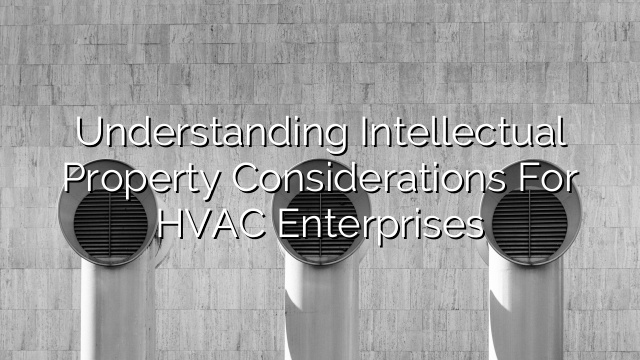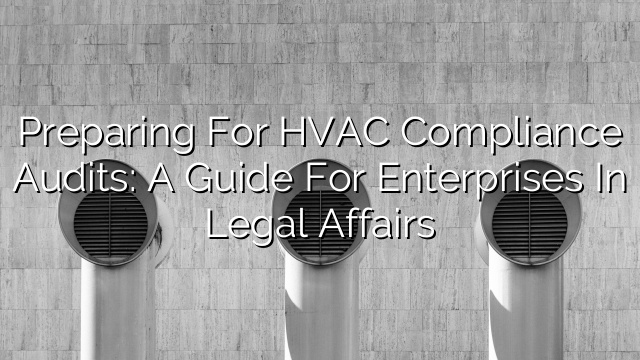Introduction
As an HVAC enterprise, it is essential to have a clear understanding of intellectual property considerations. Intellectual property refers to intangible creations of the human intellect, such as inventions, designs, logos, and brand names. By protecting your intellectual property, you can secure a competitive advantage and prevent others from using or benefiting from your innovations without permission.
In this blog post, we will explore the importance of intellectual property for HVAC enterprises, the different forms of intellectual property protection, and the steps you can take to safeguard your innovations.
The Importance of Intellectual Property for HVAC Enterprises
Intellectual property plays a crucial role in the HVAC industry for several reasons:
- Protecting Inventions: HVAC enterprises invest significant time and resources in inventing and developing new technologies and systems. Patents provide legal protection for these inventions, ensuring that others cannot copy, manufacture, or sell the same technology or system without permission.
- Building Brands: HVAC enterprises often invest in creating unique brand identities to differentiate themselves from competitors. Trademarks allow businesses to protect their brand names, logos, and slogans, preventing others from using similar marks that may cause confusion among customers.
- Safeguarding Designs: In the HVAC industry, design plays a vital role in product innovation. Design patents protect the unique ornamental features of HVAC products, preventing others from copying or imitating the appearance of your designs.
- Preserving Trade Secrets: HVAC enterprises may have valuable trade secrets, such as proprietary formulas, manufacturing processes, or customer lists. Trade secret protection ensures that this valuable information remains confidential and secure from unauthorized use or disclosure.
Forms of Intellectual Property Protection
There are several forms of intellectual property protection available for HVAC enterprises:
- Patents: Patents provide exclusive rights to inventors for a limited period (usually 20 years) to prevent others from making, using, or selling their inventions without permission. HVAC enterprises can obtain patents for new technologies, systems, or processes that they have invented.
- Trademarks: Trademarks protect brands, logos, and slogans, creating a distinctive identity for businesses. By registering a trademark, HVAC enterprises can prevent others from using similar marks that may cause confusion among consumers.
- Design Patents: Design patents protect the unique ornamental features of a product, such as its shape, pattern, or texture. HVAC enterprises can obtain design patents to safeguard the appearance of their innovative products from being copied or imitated.
- Trade Secrets: Trade secrets refer to confidential information that gives a business a competitive advantage. HVAC enterprises can protect trade secrets by implementing appropriate measures, such as non-disclosure agreements (NDA), restricted access to sensitive information, and confidentiality policies.
- Copyright: While copyright primarily applies to creative works such as literature, music, and art, it can also protect HVAC enterprises’ creative content, such as instructional manuals, website content, and marketing materials.
Safeguarding Intellectual Property in HVAC Enterprises
To ensure effective protection of your intellectual property, consider the following steps:
- Identify your Intellectual Property: Conduct an intellectual property audit to identify all the valuable assets that require protection. This may include inventions, designs, trademarks, trade secrets, and copyrighted materials.
- Research Existing IP: Before investing time and resources into developing a new product or system, ensure that similar inventions or designs do not already exist. Conduct a thorough search of existing patents, trademarks, and designs to avoid potential infringement issues.
- File for Protection: Once you have identified your intellectual property, file the necessary applications for protection. Work with a qualified intellectual property attorney to ensure that your applications are correctly filed and meet all legal requirements.
- Monitor and Enforce: Regularly monitor the market to identify any potential infringements of your intellectual property. If you discover infringement, take prompt legal action to protect your rights and seek appropriate remedies.
- Use Non-Disclosure Agreements (NDAs): When sharing confidential information with employees, contractors, or partners, use non-disclosure agreements to ensure that they understand their obligations to keep the information confidential.
- Implement Security Measures: Protect your trade secrets by implementing strict security measures, such as restricted access to sensitive information, password protection, encryption, and regular backups.
FAQs
Q: Can I protect my HVAC brand?
A: Yes, you can protect your HVAC brand by registering a trademark. A trademark provides legal protection for your brand name, logo, and slogan, preventing others from using similar marks that may cause confusion among customers.
Q: Can I patent my HVAC invention?
A: Yes, you can obtain a patent for your HVAC invention. A patent provides exclusive rights to inventors, preventing others from making, using, or selling the invention without permission. To obtain a patent, your invention should be new, non-obvious, and have industrial applicability.
Q: How long does intellectual property protection last?
A: The duration of intellectual property protection varies depending on the type of protection. Patents generally last for 20 years from the filing date, trademarks can be renewed indefinitely as long as they are in use, design patents last for 15 years from the grant date, and copyright protection typically lasts for the lifetime of the creator plus 70 years.
Q: Do I need a lawyer to protect my intellectual property?
A: While it is not legally required to hire a lawyer to protect your intellectual property, consulting with an intellectual property attorney can be highly beneficial. An attorney can guide you through the legal complexities, ensure proper filing and protection, and represent your interests in case of infringement.
Q: What should I do if someone infringes on my intellectual property?
A: If you discover infringement of your intellectual property, it is important to seek legal advice promptly. An intellectual property attorney can help you understand your rights, evaluate the potential damages, and take appropriate legal action to protect your intellectual property and seek remedies.
Conclusion
Intellectual property considerations are vital for HVAC enterprises to protect their innovations, establish strong brands, and maintain a competitive edge in the market. By understanding the different forms of intellectual property protection and implementing appropriate safeguards, HVAC enterprises can secure their intellectual assets and prevent unauthorized use or exploitation. Remember to conduct regular intellectual property audits, monitor the market for potential infringements, and seek legal advice when necessary to protect your intellectual property effectively.







